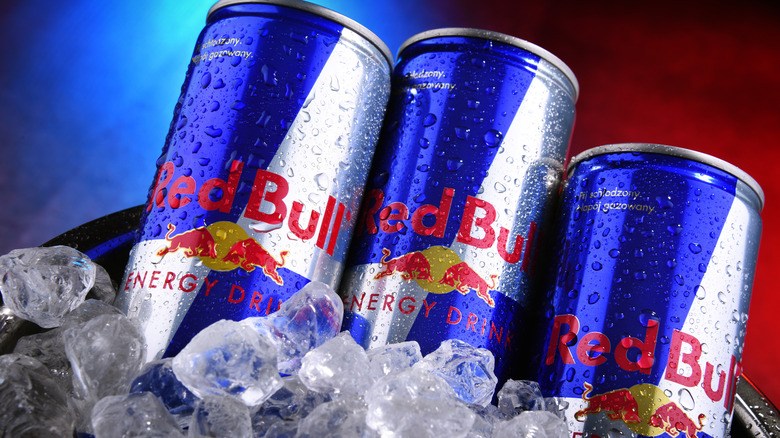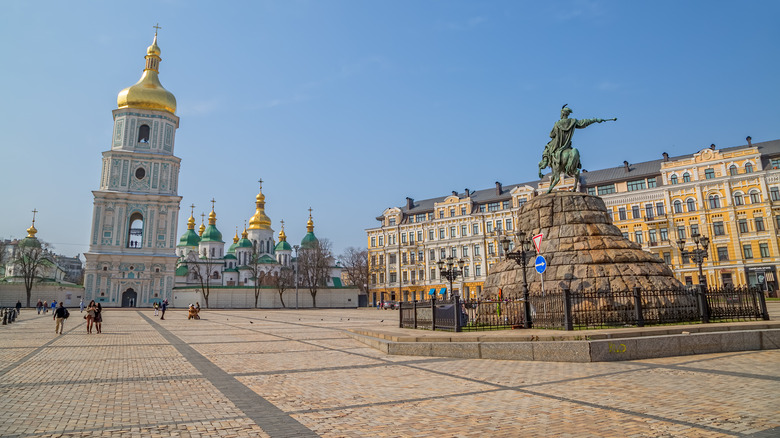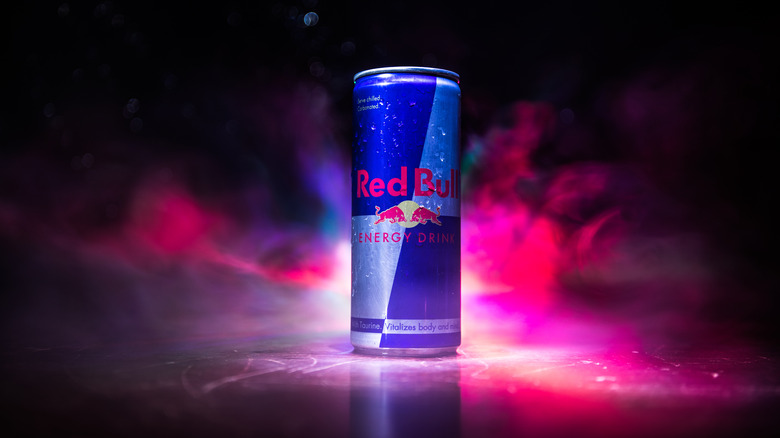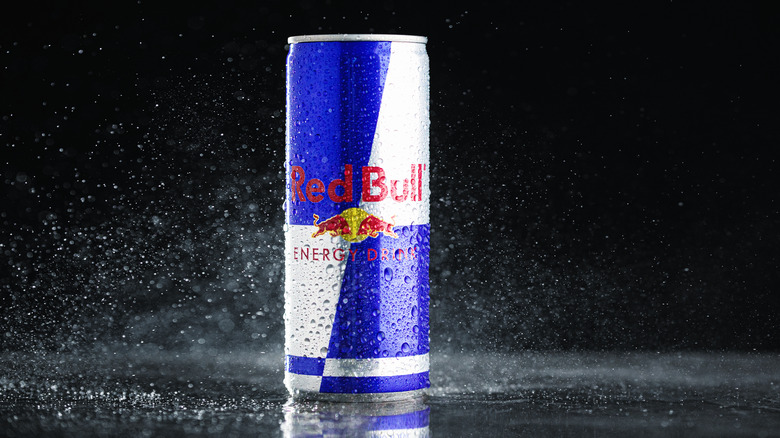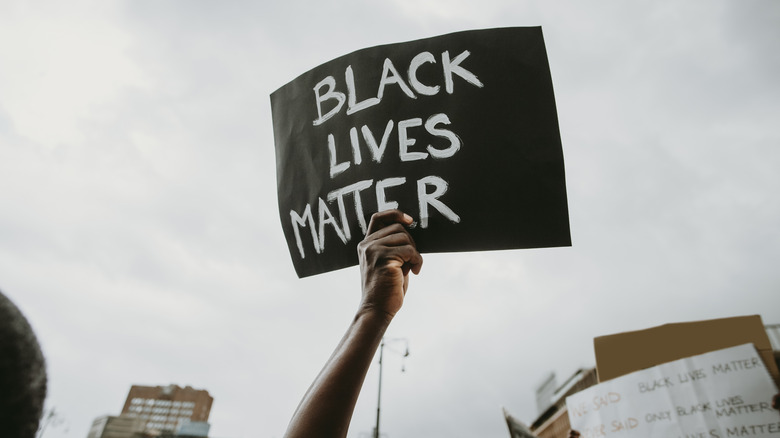Times Red Bull Got In Serious Trouble
The energy drink known as Red Bull has been a thing going on 40 years now, according to the company's website. During that time, the company has tried to market itself as a sort of devil-may-care brand that sponsors extreme sports, such as off-road rally racing or Formula-1 racecars, or hosts ridiculous events, such as the Red Bull Flugtag, a competition/exhibition of homemade flying machines — the more ridiculous, the better.
Despite its public image, however, Red Bull is a business, with decisions about the beverage company made by humans. And humans, being imperfect, sometimes bungle whatever it is they are trying to accomplish, and Red Bull's management has been no exception. The company has faced (and lost) several lawsuits, has been accused of damaging a sacred site, has run afoul of local laws, and even found itself caught up in one of the great sociopolitical controversies of the last decade.
Red Bull was accused of damaging a UNESCO world heritage site
In Kyiv, Ukraine, you'll find Sofiivska Square, a UNESCO World Heritage Site (pictured above). The square is famed for its yellow bricks, and in August 2021, Red Bull apparently decided that it was the perfect place to film a commercial. What's more, the commercial would document the vandalism of the site.
Specifically, as Jalopnik reports, the energy drink manufacturer asked for permission to send cars drifting across the square, but were denied. Allegedly, they went through with it anyway, and indeed, photos and videos posted to social media show cars doing doughnuts around the square, scuffing up the bricks with tire marks. A cleaning crew supposedly cleaned up some of the damage, but not all of it.
Kyiv Mayor Kostiantyn Usov was having none of it. "It's not just an intolerable act of vandalism; it's rude behaviors towards Kyiv residents and against one of the most sacred places of Ukraine," he wrote on Facebook (via Jalopnik), noting that he's keen to see the police get involved.
Red Bull paid millions to settle false advertising claims
You're probably familiar with Red Bull's famous slogan, "Red Bull gives you wings." While few, if any, people genuinely expect that they'll sprout actual wings when consuming the product, it seems that quite a few consumers bought into the tag line's figurative claims. Specifically, as Business Insider reported, the beverage's marketing suggests that the drink gives consumers an edge in concentration or reaction speeds, or provides some sort of physical "lift" or enhancement.
A class-action lawsuit alleged that those claims were spurious and not backed by scientific evidence. A court agreed, and in October 2014, the company was ordered to pay out $13 million in damages. That money was to go into a fund, which would then be distributed to the plaintiffs, who would receive their choice of a check for $10 or a voucher for $15 worth of Red Bull products.
The manufacturer, for its part, said in a statement that its marketing has always been "truthful and accurate," but that the company settled in order to avoid the cost of litigation.
Red Bull sued a small Turkish soda manufacturer and lost
Red Bull is not the only carbonated beverage that uses a bovine mascot. As Hurriyet Daily News reports, a Turkish soda brand uses a red ox as the mascot for its products. That was fine and dandy, at least until Red Bull learned about it. Specifically, the matter was brought to the attention of the company's legal department after the owner announced the intention to use the mascot for its brand "Zilli Öküz Gazoz," which translates to something akin to "Jingle Ox Soda."
Red Bull asked the Turkish patent office to deny the small manufacturer the right to use the image, claiming that it would lead to confusion between the two brands. Officials refused, and Red Bull sued. An Ankara court ruled in favor of the Turkish manufacturer, noting that Red Bull's bull mascot and the Turkish ox bear absolutely no similarities. Or, as The Takeout writer Allison Robicelli described it, "Red Bull was told, in legalese, to p*** off."
Red Bull was accused of mishandling the Black Lives Matter movement
In the summer of 2020, the United States went through one of the greatest sociopolitical crises of the last decade. Following the death of George Floyd, protests raged across the country (and indeed, elsewhere in the world), and renewed interest in the Black Lives Matter movement.
At the time, brands left and right wrestled with how to reconcile their own shortcomings when it came to race in light of the new reality, and Red Bull was accused of bungling it. Specifically, as Business Insider reported, employees sent an open letter to North American CEO Stefan Kozak and CMO Amy Taylor. The letter accused the company of "silence" on the Black Lives Matter movement and asked how the company would support its Black employees and the Black community as a whole. Not long after, however, the company's international headquarters in Austria fired Kozak and Taylor, even as the two were reportedly working on plans to increase the company's diversity and reach out to Black consumers. Some employees claimed the firings were "retaliation."
In a statement, Red Bull said that the company "reject[s] racism in every form."
A Red Bull heir was allegedly involved in a fatal hit-and-run
In September 2012, according to CNN, a Thai police officer was struck by a Ferrari in downtown Bangkok, dragged for some distance, and then left to die in the streets. Police followed a trail of motor oil to the home of one of Thailand's wealthiest families — a family whose holdings include a significant ownership percentage of Red Bull. The family's then-30-year-old son, Vorayuth Yoovidhya, was arrested and charged with multiple criminal counts, including reckless driving causing death.
However, the young billionaire reportedly missed court appearance after court appearance and is believed to have skipped town completely sometime around 2017. In 2020, authorities dropped all criminal charges against him.
The decision angered Thais, who claimed that Yoovidhya's case illustrates the problem of Thai justice favoring the rich at the expense of the poor. "The public sentiment is that there are different standards when it comes to the rich and the poor," said a lecturer at Siam University in Bangkok.
